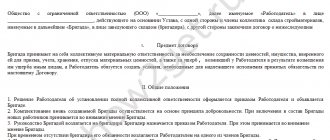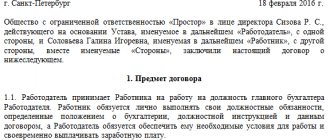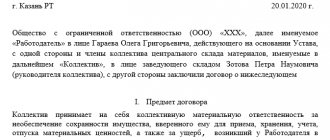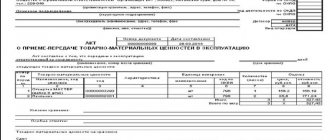Damage
Financial responsibility falls on the employee when the following conditions are simultaneously met:
- there is direct damage;
- there was an unlawful act by an employee that led to material losses;
- the guilt of the employee who caused the damage has been proven;
- there is a causal relationship between the actions/inactions of the employee and material losses.
Direct (or actual) damage is damage to the company’s actual property caused by:
- loss of property or any part thereof;
- appropriation of company property;
- damage to company property;
- decrease in the value of the company's property;
- being forced to incur costs for the acquisition, repair or restoration of property;
- being forced to make additional payments to any third parties.
Examples of damages are shortages; property damage; expenses for repair work; monetary fines or penalties for obligations not fulfilled by the company; payment by the company for forced absences to employees; payment of forced downtime of equipment and other costs. That is, financial liability is imposed both for harm caused to the company with which the employee is in an employment relationship, and for harm caused by the company to third parties.
There are regulatory documents, and studying them helps the company's top management avoid many problems.
- List of positions and works filled or performed by employees with whom the employer can enter into written agreements on full individual financial responsibility for shortages of entrusted property
- Standard form of an agreement on full individual liability
- List of works during the performance of which full collective (team) financial liability for the shortage of property entrusted to employees can be introduced
- Standard form of an agreement on full collective (team) financial liability
Damage caused to the company is compensated in accordance with the Labor Code of the Russian Federation. If an employee must compensate for damage in an amount not exceeding his average monthly salary, then by order of the company’s top management (the head of the organization, his deputy), the money is withheld from the salary. Such an order must be issued no later than two weeks from the date the damage caused by the employee was determined.
Money can be withheld no earlier than a week from the date of notification of the withholding to the employee. If the employee does not agree to the deduction or the amount of the deduction, then he must submit an application. The dispute over such an application will be considered in the manner prescribed by law. In all other cases, to compensate for damage, the company's management must file a claim with a judicial authority.
If management violated the procedure and made an illegal deduction from an employee’s salary, then the labor dispute resolution body, having considered the employee’s application, will oblige the administration to return the withheld money.
Recovery of material damage from the administration of state and municipal institutions is carried out in court. To initiate a case, you need a claim from a higher authority or a statement from the prosecutor.
The employee must compensate for the damage caused to the company, regardless of whether the employee is brought to disciplinary/administrative/criminal liability.
Before management issues an order to withhold the amount of damage from an employee’s wages, the employee must provide a written explanation of the reasons why the damage occurred. Refusal to provide written explanations does not affect the holding of the employee to financial liability. However, we must remember that such a refusal shows the employee’s disagreement with the management’s decision, and this is usually how a labor conflict begins. It is advisable for the company’s management to document the employee’s refusal in front of witnesses.
Before holding an employee accountable, the administration should carefully analyze the situation and make sure that the cause of the damage was the worker’s fault. If there is a written explanation from the employee, management should take into account the opinion of the subordinate. However, an employee’s disagreement with the financial responsibility assigned to him or with the amount of deductions is not a reason to suspend the deduction order. An employee has the opportunity to appeal to the appropriate judicial authority to resolve a labor dispute.
If the amount of compensation for damages is more than the employee’s average monthly earnings, then management can withhold it only after a decision of the judicial authority. In this case, the administration does not have the right to collect average monthly earnings towards the total amount of damages.
The sequence of actions of the company's top management to compensate for damage should be as follows:
- Determine the amount of damage caused.
- Analyze the reasons that led to it.
- Take written explanations from the employee responsible for the damage or record in front of witnesses the employee’s refusal to give such explanations.
- Establish the amount of financial responsibility of the employee.
- Issue an order for damages or apply to a judicial authority for a decision to withhold money from wages.
How to hold an employee accountable?
To attract an employee to compensation for damages in accordance with Art. 244 of the Labor Code of the Russian Federation, the following conditions must be present:
- reaching the age of 18 years (Part 1 of Article 244 of the Labor Code of the Russian Federation);
- performing functions that are associated with servicing monetary and commodity valuables, according to the position provided for in the List;
- conclusion of an agreement on full individual financial liability;
- committing guilty and illegal actions when servicing valuables entrusted to him;
- causal relationship.
Damage caused to the employer must be documented, for example, by an inventory act. The employee must be required to provide written explanations as to what caused the damage. If he refuses to provide them, it is necessary to draw up a corresponding act.
The amount of damage is determined by actual losses, which are calculated based on market prices prevailing in the area on the day the damage was caused, but not lower than the value of the property according to accounting data, taking into account the degree of depreciation of this property.
Compensation for damage is made regardless of whether the employee is brought to disciplinary, administrative or criminal liability for actions or inactions that caused damage to the employer (Part 6
Art. 248 Labor Code of the Russian Federation
).
The employee who caused the damage may voluntarily compensate it in full or in part, and may, with the consent of the employer, transfer equivalent property to compensate for the damage. By agreement of the parties, compensation for damage is possible in installments according to a written obligation of the employee. In this case, the employer has the right to exempt the employee from compensation for damage.
Lost income (lost profits) cannot be recovered from the employee (
Art. 238 Labor Code of the Russian Federation
). This restriction does not apply to the leaders of the organization (Part 2
Art. 277 Labor Code of the Russian Federation
, part 2 art. 15 of the Civil Code of the Russian Federation).
If an employee refuses to compensate for damage voluntarily, it can only be recovered in court. The employer has the right to go to court within one year from the date of discovery of the damage caused. The court may reduce the amount of the collected amounts, but does not have the right to completely release the employee from compensation for damages. The court has no right to reduce the amount of compensation if the damage was caused for personal gain.
Financial liability to the employer exists for all employees. But it can take different forms:
- Limited (Articles 231, 238, 241 of the Labor Code of the Russian Federation), in which an agreement on financial liability is not concluded, the employer has the right to independently recover damages from the employee in a limited amount, and if the amount established by law is exceeded, only through going to court (Article 248 Labor Code of the Russian Federation).
- Full individual (Articles 242, 243 of the Labor Code of the Russian Federation), which arises when the volume of property for which the employee is responsible is easily specified, the employee is provided with the conditions for control over it and the employee is assigned the corresponding responsibility.
- Full collective (Article 245 of the Labor Code of the Russian Federation), which differs from full individual in that a certain amount of property is under the control of a group of persons who are simultaneously assigned this responsibility.
Both types of full financial liability are accompanied by the employer drawing up a written (Articles 244, 245 of the Labor Code of the Russian Federation) agreement on financial liability: in the first case - with each financially responsible person, in the second - with all members of the group. Material assets are transferred to them according to the inventory and are periodically subjected to inventory.
A complete list of positions and work in which either one or another type of responsibility arises is contained in Resolution of the Ministry of Labor of the Russian Federation dated December 31, 2002 No. 85. Examples include:
- for individual - cashier, storekeeper, forwarder, driver;
- for a collective one - a team of sellers, a team of builders or storekeepers.
It is advisable to draw up an agreement on financial responsibility either simultaneously with the appointment of an employee to a position involving corresponding responsibility, or when starting work with this responsibility. Persons under 18 years of age are not allowed to enter into such agreements (Article 244 of the Labor Code of the Russian Federation).
All the nuances of the relationship between the employer and employees regarding financial liability can be systematized in an internal regulatory act.
Do you have any doubts about how to correctly carry out this or that procedure related to personnel records management? On our forum you can dispel any doubts. So, here you can clarify with whom and in what form an employment contract with financial responsibility is required.
We invite you to read: What is included in the total work experience
What is the contract for?
Employees of a company may be held financially liable if they, through their actions or inactions, caused material damage to the organization.
These provisions are enshrined in law, and the employee can be exempted from it if the company’s material losses arose due to reasons beyond the employee’s control.
Such force majeure reasons include:
- fires;
- natural disasters;
- floods and other disasters.
An employee is also exempt from financial liability if damage to property was caused as a result of his taking measures for self-defense.
Important! If an employee causes damage to the company, full financial liability arises only when a financial liability agreement is drawn up with this person.
Therefore, when hiring financially responsible persons, it is necessary to draw up an agreement on full financial responsibility. For example, with a storekeeper, driver, watchman, etc.
If this is not done, then the employee can only be recovered for damages within the limits of his salary for one month. In this case, financial liability is limited.
An agreement on full financial liability can only be concluded with a company employee. Therefore, it is often considered an annex to the employment contract.
Attention! Financial responsibility is often established as a condition
employment contract
. Important for drawing up an agreement on full financial liability is the employee’s work with the company’s material assets.
In some cases, drawing up an agreement on full liability is mandatory.
Such professions include, for example:
- cashier;
- accountant;
- storekeeper;
- warehouse manager;
- driver for the car;
- watchman;
- etc.
Under what circumstances does financial liability arise?
Damage due to violations committed by:
- intentionally;
- drunk;
- after hours.
Liability also arises if damage to the employer’s property is caused by:
- disclosure of corporate secrets;
- violation of the law;
- the consequences of the action taken;
- failure to fulfill official duties.
IMPORTANT! However, the employer is obliged to make every effort to preserve its values. For example, if a warehouse worker performed his duties, but due to the absence of an alarm system in the premises, the warehouse was robbed, then the warehouseman cannot be held accountable.
Types of contracts and what is their difference
There are several types of liability agreements. Let's take a closer look at them.
| Characteristics | Individual agreement on full financial responsibility | Collective agreement on full financial responsibility |
| When is | Sharing of responsibilities is possible | Separation of responsibilities is not possible |
| Parties to the agreement | Employer and employee | The employer and the team of workers, which must be represented by its manager. He is appointed or elected by the members of the team. |
| Contents of the liability agreement | Standard content of a liability agreement. A list of situations when financial liability may arise must be included. | Standard content of a liability agreement. A list of situations when financial liability may arise must be included. |
| Who signs | Employer and Employee. | The employer and all employees included in the team. |
We invite you to read: How to obtain Russian citizenship under the program for the resettlement of compatriots in 2020
Is a contract always necessary?
Despite the widespread belief that this agreement is needed only for subsequent punishment of the employee, this is not entirely true. As practice shows, the presence of a concluded agreement on financial liability helps to increase the level of performance by employees of their professional duties. Naturally, if an employee always remembers that his responsibility is documented, he will be much more careful about the employer’s property.
On the other hand, it is the concluded contract that is often the basis for challenging the unlawful actions of the employer and protecting the rights of the employee in the event that they have been infringed. Thus, the signing of this document is in the interests of both parties to the labor relationship.
Home page → Useful information → Job descriptions → Storekeeper
Is it necessary to conclude?
The Labor Code of the Russian Federation allows the employer to enter into a full liability agreement only with certain categories of employees who have reached 18 years of age. The list of positions and jobs with which this can be done is listed in Resolution of the Ministry of Labor of Russia dated December 31, 2002 N 85.
This document includes two sections:
- The first section contains a list of positions with which it is envisaged to conclude individual contracts for financial responsibility. In particular, this is provided for the cashier, cashier-controller, and other employees who have the duties of cashiers.
- The second section contains a list of jobs, and full responsibility agreements can be concluded with the workers involved. This includes, for example, the acceptance and payment of various payments, the sale of any goods, work or services (including through the cash register, seller, waiter, etc.), servicing vending machines, producing coupons and subscriptions, etc.
A good warehouse manager is a real boon for any company with a warehouse. The responsibilities of a storekeeper depend on the type and size of the warehouse, the number of subordinates, as well as the wishes of the immediate supervisor.
Before employment, it is important for a future employee to clearly understand his duties, area and degree of responsibility. All this is prescribed in the employee’s job description; it may also be necessary to conclude an additional agreement on the financial responsibility of the parties.
Dear readers! Our articles talk about typical ways to resolve legal issues, but each case is unique.
If you want to find out how to solve your particular problem, please use the online consultant form on the right or call. It's fast and free!
Show content
The storekeeper in a warehouse is considered one of the key figures; he has enormous responsibility and, accordingly, responsibilities:
- Organize the work of the warehouse in such a way that all employees are involved and their working resources are sufficient for the normal functioning of the enterprise.
- Manage and directly participate in such warehouse operations as receiving goods, allocating space for them, moving goods around the warehouse, safety, ensuring proper temperature conditions and storage conditions for products.
- Assemble and package goods in accordance with consumable documentation and adhere to rotation (FIFO principle - first in, first out).
- Control of loading/unloading time of transport, organization of relevant work.
- Receiving and processing returns to and from the warehouse.
- Drawing up reports of substandard conditions, making write-offs within the limits of one’s capabilities.
- Maintaining incoming and outgoing documentation.
- Conducting inventories, reporting on recounts to the immediate supervisor and higher management.
- Monitoring the serviceability of inventory and other warehouse property.
- Compliance with labor regulations, safety regulations, and sanitary standards in person. Monitoring compliance by subordinates.
- Monitor the availability and serviceability of fire fighting equipment and the condition of the premises. Drawing up and timely submission of defective statements for faulty inventory, equipment, etc.
- Carry out other official assignments received from the manager.
The position of warehouse manager is included in the list of employees with whom an additional liability agreement may be concluded in accordance with Art. 224 of the Labor Code of the Russian Federation on full individual financial responsibility for property entrusted to perform their functional duties. The list of such positions was approved by the Ministry of Labor of the Russian Federation “On approval...” dated December 31, 2012 No. 85.
An employee who holds the position of storekeeper and performs work that is directly related to the preservation of the material assets of the enterprise takes responsibility for ensuring the storage of property entrusted to him by the employer. In this regard, the storekeeper undertakes to treat the enterprise property transferred to him with care and prevent all possible cases of damage.
The financial liability of a warehouse employee can be either full or limited.
The difference is that with limited liability the employee is responsible for property within the limits of the average monthly salary. With full liability, the warehouse manager is fully responsible for the safety of the property entrusted to his use (for details about what full financial liability is and how to draw up an appropriate agreement, read our material).
A detailed list of cases that determine the onset of full financial liability is determined by Article 243 of the Labor Code of the Russian Federation. In this case, the corresponding agreement may not have been initially concluded between the storekeeper and the employer. Such cases include:
- intentional damage to the employer's property;
- deliberate failure to comply with the duties of a storekeeper, resulting in damage to the employer’s property;
- actions under the influence of alcohol or drugs;
- criminal nature of the employee’s actions, etc.
From this it is clear that the amount of financial liability varies and depends on the specific situation.
The condition for recovery is proof of damage to the employer by a warehouse employee. Damage is defined as damage, shortage or destruction of property. The fact of damage is determined by recalculating the inventory of the warehouse.
In order to timely identify such facts, inventories are carried out according to the company’s accepted schedule. In some situations, additional recounts are carried out (mainly when warehouse workers are suspected of theft or other criminal acts).
In most cases, issues are resolved at the local level. The court intervenes only if the parties do not reach an agreement.
The conclusion of an agreement occurs when a responsible person is appointed to the position of storekeeper or warehouse manager. The provisions of Article 244 of the Labor Code of the Russian Federation require that the employee be an adult and his activities include direct maintenance of the employer’s property.
- Article 244 of the Labor Code of the Russian Federation. Written agreements on full financial responsibility of employees
- Written agreements on full individual or collective (team) financial liability (clause 2 of part one of Article 243 of this Code), that is, on compensation to the employer for damage caused in full for the shortage of property entrusted to employees, can be concluded with employees who have reached the age of eighteen years and directly servicing or using monetary, commodity values or other property.
- Lists of works and categories of workers with whom these contracts can be concluded, as well as standard forms of these contracts, are approved in the manner established by the Government of the Russian Federation.
You can view a standard form and sample agreement on full financial responsibility between an employee and an employer here, and from this article you will learn what the conditions are for concluding an agreement on individual financial responsibility.
Employees whose work is directly related to the reception, storage and transfer of material assets must take financial responsibility for the property of the enterprise where the work is performed. The functional responsibilities of a storekeeper (warehouse manager) involve the conclusion of such an agreement. It comes into force from the moment it is signed by both parties and affixed with the seal of the enterprise.
A warehouse employee may refuse to sign it in the following cases:
- Before concluding the contract, an inventory and inventory of the entrusted property was not carried out.
- The employer does not guarantee the creation and provision of appropriate conditions for the warehouse employee to perform his professional duties.
The agreement is drawn up in 2 copies and must include:
- full name of both parties;
- employee responsibilities;
- employer responsibilities;
- details of the parties.
We invite you to familiarize yourself with: Order on the appointment of a person responsible for maintaining work records, sample
In this case, the obligations of the parties may not be fully specified, and if disputes arise, the parties go to court, where the decision is made in accordance with the norms and rules of the Labor Code of the Russian Federation.
ATTENTION! Amendments or termination of the contract are possible with the consent of both parties.
The signing of an agreement on the material liability of the storekeeper is primarily for the enterprise’s ability to recover damages from the employee who caused it. The position of a warehouse employee is quite responsible and negligent attitude towards his duties can entail serious penalties from him.
But we should not forget that the employer also has obligations, failure to comply with which exempts the storekeeper from financial penalties for damage incurred by the enterprise.
Unlike other positions, the warehouse manager performs his duties not only in accordance with the terms of the civil law code, but at the same time is responsible for the property of the employer within the limits of his average monthly salary.
The position of “storekeeper” is included in the list of professions approved by the Labor Code of the Russian Federation, which, by their specific nature, bear full financial responsibility for the property entrusted to them by the head of the enterprise.
Therefore, when concluding an employment contract, the law requires signing an additional agreement with the future employee on full financial responsibility, provided for in Art. 244 of the Labor Code and No. 85 by the Resolution of the Ministry of Labor dated the end of 2002.
This document must be drawn up and signed by the storekeeper before he takes office. In addition, the law recommends that the manager conduct an inventory and familiarize the new employee with its results.
The first working day should be devoted to the acceptance of goods and materials. Otherwise, the consequences may be disappointing. They will definitely try to blame any deficiency on an inexperienced subordinate.
Main responsibilities of a storekeeper
After signing an agreement with management and accepting the position, in addition to certain rights, the storekeeper has quite a lot of obligations, which include:
- Organizing the normal functioning of the warehouse by involving the labor force of all employees;
- Direct participation in the arrival of new products, placing them in the warehouse, ensuring safety under proper storage conditions;
- Ensuring control over the loading and unloading of goods, organizing the work of loaders;
- Maintaining necessary documentation;
- Carrying out inventory work and reporting the results to immediate superiors;
- Systematic checking of the operability of entrusted equipment and the serviceability of other commercial property;
- Personal adherence to safety rules and monitoring their compliance by subordinate employees;
- Monitoring the performance and serviceability of all safety equipment at the entrusted work site.
If all official obligations are met, the storekeeper does not have to worry about the loss of the company’s valuable property entrusted to him on the basis of the concluded agreement. A conscientious attitude towards performing work activities will ensure the citizen long-term cooperation with the management of the organization.
Work of the judiciary
The judicial authorities consider the following cases of matrimonial liability:
- A claim by the company's management for damages not exceeding the average monthly salary in the event that the money cannot be recovered by order. For example, management missed the deadline established by law for issuing an order; the employee terminated his employment contract with the company.
- A claim by the company administration for compensation for damages exceeding the average monthly salary of the employee.
- Claim by an employee who does not agree with the deduction made by management or with the amount of damages. A necessary condition for judicial proceedings must be the preliminary consideration of the employee’s claim in the prescribed manner.
To apply to a judicial authority, a company manager can use a sample statement of claim.
Sample agreement on material liability of a storekeeper
A storekeeper is an employee responsible for the safety and release of various goods from the warehouse, as well as keeping records of valuables in the warehouse.
A warehouse is a structural space where various types of goods are stored. Everything stored in a warehouse is considered material assets. The storekeeper is considered a financially responsible person responsible for receiving, disposing, storing, accounting and issuing.
In this case, it is worth concluding an agreement on financial liability, which is an annex to the employment contract with the worker.
The employee takes responsibility for the safety of the material assets of the enterprise, and is obliged to make efforts to ensure that the property is not lost in some way.
The liability agreement establishes the preconditions under which the employer will be compensated for material damage in full. A certain number of positions are provided for by the legislation on the conclusion of an agreement on financial liability with an employee.
Advantages
For an entrepreneur, there are at least two reasons why the conclusion of an agreement is considered justified:
- in a situation where an employee does not agree with the demands made on him for compensation for losses incurred, a liability agreement guarantees in this situation the protection of the employer’s rights;
- if the contract was not concluded, then it will not be possible to recover more than the average monthly salary from the storekeeper. (According to Article 119 of the Labor Code of the Russian Federation)
How to apply
It is necessary to make sure that the person with whom the liability agreement is concluded meets all the requirements for these persons. The contract forms must be filled out by indicating the full name of the organization in the appropriate column.
Then enter the full name of the head of the organization authorized to sign documents of this type and the full name of the employee taking on the obligations specified in the contract.
The liability agreement must contain the following clauses:
- subject of the contract;
- duties of the parties;
- the procedure for establishing the amount of damage and the conditions for its compensation;
- additional conditions;
- details of the parties;
In the “obligations of the parties” paragraph, you must first describe the requirements presented to the storekeeper: compliance with the rules of storage of goods, record keeping, participation in the audit, compensation for damage caused.
Then the employer’s responsibilities: creating working conditions, familiarizing the storekeeper with the current legislative acts in his field of activity and timely carrying out inspections.
In the final part, clearly state the conditions determining the amount and method of compensation for damage, the obligations of the storekeeper, the time the contract comes into force and its validity period, the number of copies of the contract and the inclusion of amendments to its content.
Next, the contract must be submitted to the head of the enterprise and the worker for signature. Place the seal of the enterprise on the contract form and indicate the date of its conclusion, then hand over one copy to the storekeeper, and the second to the appropriate service of the organization.
The employer must know that adding a clause on financial liability to the employment contract does not give the worker the right to recover all damages from him, since full liability is imposed only upon the conclusion of an additional agreement.
You can find out what limited liability is in this article.
Of the entire list of positions in which one way or another it is possible to come into contact with material assets, the position of storekeeper stands apart.
Starting from the opening of the warehouse until it is placed under guard, he passes through his hands goods with a total value exceeding his salary by hundreds and thousands of times.
The results of this contact should ideally be the same: either receiving the goods and storing them, or packaging the goods and sending them. However, this state of affairs does not always persist and extraneous factors interfere with the processing of warehouse materials.
These factors influence the correspondence of the goods declared in the warehouse to its actual availability and make both of these indicators unequal to each other.
The reasons for such situations may be different, but in the end only two questions arise: who is to blame, and what to do? We'll talk about this today.
Resolution of the Ministry of Labor of Russia dated December 31, 2002 No. 85 determined the list of positions and categories of employees with whom the employer can enter into contracts on labor protection. Among others, this list also contains the position of storekeeper. The second part of the same Resolution defines the range of work performed by the storekeeper.
The legality of concluding this agreement in this way is not subject to doubt.
The Labor Code specifies the main provisions regulating the employee’s performance of his duties, while the DMO reveals the concept of the employee’s responsibility specifically for specific violations (shortages, damage to material assets, etc.). The same DMO also determines the consequences of these violations. To reduce the risk of controversial situations, a separate article in the Labor Code prescribes the conclusion of a DMO with the storekeeper.
The DMO is not always drawn up simultaneously with the TC. Moreover, if the storekeeper undergoes an internship or preliminary training outside the workplace, the DMO is concluded only after the completion of this process. Only when an employee is allowed to access material assets does he sign up for responsibility for the goods entrusted to him.
To conclude a DMO with a specific employee, a separate order from the head of the company is not necessary, but a separate order establishing financial liability must necessarily precede the very procedure for its introduction.
We invite you to read: Social tenancy agreement for a municipal apartment - where to get and how to register for social tenancy housing, is exchange possible? residential warrant: what is it?
The order establishing financial liability should be based on the main activity, and not on the personnel. Before the Order is created, the organization develops a Regulation on Material Liability, which indicates the financial liability of the parties to the TD in accordance with Section XI of the Labor Code of the Russian Federation.
Individual MO
This type of agreement is preferable to conclude in the following cases:
- The storekeeper is the only employee of the company whose responsibilities include processing material assets.
- The warehouseman performs specific work in the warehouse (or works in a specific area), making it impossible for him to cause damage to product groups that are not under his jurisdiction. As a rule, this employee works in warehouses with a separate type of storage of goods and is responsible only for his area.
Collective MO
The most common type of DMO. Its presence is regulated by Article 245 of the Labor Code of the Russian Federation, which directly indicates its creation in the case when it is not possible to differentiate the responsibilities of storekeepers when performing work together.
This type of DMO is also convenient because it practically does not require re-contracting in the event of the dismissal of one or more employees. It should be remembered that if the team changes by more than 50%, as well as if the head of the warehouse (or team) changes, the collective DMO must be re-concluded, as it loses legal force.
The company name must exactly match the legal name, without the slightest deviation. Even the presence or absence of punctuation marks will be a violation.
The storekeeper's name must match his passport details.
Subject of the Agreement
The employer entrusts, and the storekeeper assumes, the responsibilities for preserving the property.
This can be not only the goods that the storekeeper works with in the warehouse, but also warehouse equipment, as well as work clothes, tools, etc. The entire list of goods is not listed in the DMO, but the procedure for transferring material assets for storage or use is indicated.
Validity
The period during which the Agreement is in force is indicated.
This paragraph describes the legal actions of the parties and the activities preceding these actions.
Cases in which liability is excluded are indicated here, as well as links to specific articles of the Labor Code of the Russian Federation.
Termination procedure
Cases of termination of the contract are prescribed separately.
Dispute Resolution
A necessary article of the Agreement, which provides the parties with the right to protect their interests in court.
A list of situations that make the implementation of DME impossible, as well as a determination of the degree of responsibility of specific individuals.
Key points to pay attention to when signing a DMO.
The position of a storekeeper involves constant work with various inventory items. This specificity imposes special responsibilities on the storekeeper to preserve the entrusted property.
These relations between employee and employer are subject to regulation. In order to protect its interests, the employer draws up and signs, together with the employee, an agreement on full financial responsibility.
According to this document, the storekeeper is warned of full financial responsibility for the safety of the employer’s goods or products.
The agreement may be related to the employee's individual obligation to preserve the employer's goods. A collective document is also possible, concluded between the employer and several persons who perform related work. Such a condition must be specified in the contract;
The main condition of the document is the obligation to compensate for damage caused by the actions of the employee. Such damage is subject to full or partial compensation. It must be caused by actions or inactions within the scope of the work performed;
The institution may assign additional responsibilities to the storekeeper. The employee must handle the company's property with care, take the necessary measures to preserve it, and in the event of a threat to the property, he must prevent damage to it.
What should the contract contain?
The law does not define any requirements for a liability agreement. Typically, each company draws up a standard template in which it indicates all the essential conditions of its day, and which, however, should not contradict the Labor Code.
The contract must begin with an indication of its name, as well as the place and date of its execution.
The next step is to identify each party to the contract. The company must indicate its name, information about the director, as well as the document on the basis of which he conducts his activities. For an employee, here you must indicate the position title and his full name.
Next, it is necessary to indicate in detail the responsibilities of the person to ensure the safety of the property. For example, here we can mention the obligation to document each movement of material assets, periodic inventory, etc.
Then it is necessary to describe the measures that the employer himself is taking to protect his property. For example, this may include installing a safe, equipping the premises with a security alarm, engaging a third-party security company (PSC), etc.
The contract must mention the provision of the employee with a job description and other documents establishing the need for full financial responsibility.
Next, it is necessary to indicate the cases in which the employee will be held financially liable. Situations in which such liability does not arise should be separately identified - for example, in the event of natural disasters, forced defense, etc.
Attention! The contract must indicate the number of copies in which the contract was drawn up, the procedure for its termination or extension for a new term.
The agreement must be completed with the details of each party, signatures and seals.
Financial liability of warehouse workers
The storekeeper carries out one-time orders from the director of the company related to the activities of Versiya LLC.
1.8. The storekeeper must have a neat appearance, be energetic and positive, have good communication skills, and contribute to the creation of a favorable business and moral climate in the team.
1.9. The storekeeper in his work is guided by:
- orders and instructions from the head of the workshop, head of the sales department, foreman
plot;
- regulations, instructions and other guidance materials of the company;
-regulatory documents on the organization of warehousing;
-standards and technical specifications (hereinafter referred to as TU) for goods and materials.
-types, sizes, brands, grades and other qualitative characteristics of goods and materials and their consumption rates;
-requirements for organizing loading and unloading operations;
-rules and procedures for storage and warehousing of goods and materials;
- provisions and instructions for their accounting;
- internal labor regulations;
-current labor legislation of the Russian Federation;
- regulatory and technical documentation (NTD) of the quality system in its area of activity;
- labor protection management system (OSMS);
-enterprise standards (STP);
-rules of industrial sanitation and fire protection;
- the current legislation of the Russian Federation;
- this job description.
Is it possible to hold an employee financially liable without a contract?
The Labor Code establishes that an employee can be held financially liable only within the limits of his average monthly earnings, with the exception of other cases provided for.
Such other cases include:
- If the Labor Code or federal laws impose full financial liability on the employee for damage caused during work;
- If there is a shortage of valuables that were transferred to him on the basis of a written agreement or a one-time document;
- If he caused the damage intentionally;
- If he caused damage while under the influence of alcohol or drugs;
- If the damage was caused as a result of criminal acts determined by the court;
- If the damage occurred due to the disclosure of state, commercial or other secrets, when this is provided for by law;
- The damage was caused due to the employee's failure to fulfill his duties.
Attention! Thus, the absence of a liability agreement is actually the employer’s refusal to recover the full amount of damage from the employee. In this situation, it will be possible to bring him to justice only within the limits of his average monthly earnings.
Tags: contract, material, responsibility
What can be considered material damage
The employer has the right to hold employees financially liable in the manner established by the Labor Code of the Russian Federation and other federal laws (paragraph 6, part 1, article 22 of the Labor Code of the Russian Federation).
According to Article 238 of the Labor Code of the Russian Federation, the employee is obliged to compensate the employer for direct actual damage caused to him. It also defines direct actual damage as a real decrease in the employer’s available property or deterioration in the condition of said property, as well as the need for the employer to incur costs or make unnecessary payments. The same applies to the property of third parties held by the employer, if the employer has obligations to preserve this property.
Thus, direct actual damage may include a shortage of monetary and property assets, damage to the employer’s equipment and materials, and costs of repairing damaged property.
Article 241 of the Labor Code of the Russian Federation establishes the limits of an employee’s financial liability. Workers are liable within the limits of their monthly earnings, unless an agreement on full financial liability has been concluded with them, which consists of their obligation to compensate the damage caused to the employer in full.
Learn more about how to hold an employee financially liable.
We invite you to read: Certificate of income during maternity leave









